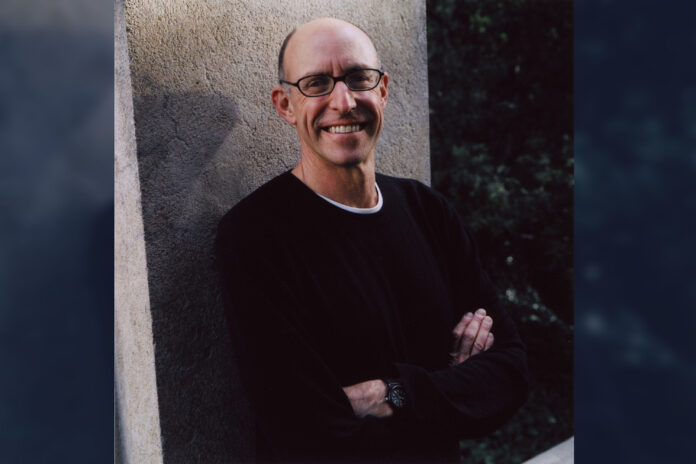Journalist Michael Pollan is known for exploring our relationships with food, plants, and the natural world. Most recently, he has turned his attention to the history and healing powers of psychedelics. In a Netflix series that debuted last August called How to Change Your Mind, Pollan surveys the history and current uses of four psychedelics—LSD, a potent symbol of the 1960s counterculture; psilocybin, a component of “magic mushrooms”; mescaline, found in some cactus species; and MDMA, a synthetic drug widely known as Ecstasy.
The Netflix series covers the wave of new research on psychedelics as therapeutic agents to treat mental health issues like depression, anxiety, post-traumatic stress disorder, and addictions. It was based on Pollan’s best-selling 2018 book of the same name, which included accounts of his own guided experiences with psychedelics and of their psychological, emotional, and spiritual impacts.
Pollan, a professor at Columbia University’s Graduate School of Journalism, is also a co-founder of the UC Berkeley Center for the Science of Psychedelics, which was established in 2021. David Tuller, DrPH, a senior fellow in public health and journalism at UC Berkeley’s Center for Global Public Health, recently spoke with him on behalf of the Wellness Letter about why older people should be interested in psychedelics, the consciousness of plants, and the benefits of gaining distance from one’s ego.
David Tuller: I told my mom I was interviewing you about this. She’s 92 and a Wellness Letter reader, and she said, “David, don’t take psychedelics. And if you already have, don’t do it again.” What would you want someone like my mom to get from watching the series?
Michael Pollan: I would want your mother to open her mind to the idea that psychedelics can have benefits. I actually think they have particular value as we get older, because one of the things they seem to do is dissolve habitual ways of acting and thinking. And surely, as we get older, we get more stuck in our habits. But look, psychedelics carry a lot of baggage from the late 1960s and the backlash to that time. Before then, these molecules were regarded as incredibly promising treatments for mental illness and addiction. And all through the 50s and into the 60s they were a respectable subject of academic research, but all that was lost to history in the backlash.
The backlash was the result of a lot of reckless use of psychedelics as well as their association with the counterculture and the antiwar movement. Nixon regarded psychedelics as one of the reasons for American boys refusing to fight in Vietnam. Taking psychedelics was this big rite of passage that young people were going through. But unlike most rites of passage in adolescence, you didn’t end up in the adult community when you were done.
DT: You’ve written about your own experiences with using psychedelics under the eye of someone guiding you through it. Can you offer an example or two of what it was like and how it “changed your mind”?
MP: One example is that I had an experience of utter and complete ego dissolution, where I looked out and saw myself as I exploded into a cloud of Post-it notes that then drifted to the ground. And it was me, but I was also observing it. Then it was over, and it was fine. I mean, I had complete and total equanimity about the experience, which was sort of like a death rehearsal. I was watching myself from a new vantage point that was unfamiliar but completely objective and untroubled. Consciousness didn’t cease, though. And the idea that you could have consciousness without an ego or self—that’s a powerful experience. Buddhists obviously experiment with that state and attain it sometimes. For me, the lasting effect was to put a little distance between me and my ego.
DT: Were you able to sustain that feeling or sensation afterwards?
MP: You do go back to baseline afterwards. But I have these memories of the experience, and there was a learning that happened, which is something like, “I don’t have to listen to my ego; I’m not identical to that voice in my head.” And that’s a very useful thing to know. Now that insight often happens in psychotherapy, too. There are other ways to get there. But it happened for me in an afternoon. And I think that was significant.
I also had experiences where the consciousness of other species seemed very real to me, plants in particular. And this is a very curious but common thing that happens to people on psychedelics. They’re more willing to attribute consciousness to others—animals, plants, and even inanimate things. And you know, I’ve always had enormous respect for the agency of plants. I’ve written about them a lot. But it became more viscerally real to me than it was when it was simply an intellectual conceit.
DT: Did that change your perception of plants, or did it just confirm or reinforce what you already felt?
MP: It reinforced a hypothesis I had about plants, which is that they have their own form of subjectivity, and that they’re not as passive as we think they are, that they’re using us as we’re using them. Plants don’t seem quite as conscious to me now as they did during the experience, when I really felt their gaze on me. But yes, I think it enhanced my sense of their agency.
DT: What is currently happening in this field of science?
MP: The science is going remarkably well. Since I published How to Change Your Mind in 2018, psychedelic research centers have popped up all over, not just at Berkeley—there are at least a dozen now. There have been trials of psilocybin for depression, which hadn’t happened when I was writing about it. Psilocybin trials are also underway for obsessive compulsive disorder and eating disorders. And many of the results are quite encouraging. A successful phase 3 trial [phase 3 trials are the final stage of research required for FDA approval] using MDMA to treat PTSD has moved the drug closer to FDA approval. The FDA asked for one more phase 3 study, and that is underway. Psilocybin is a couple of years behind. I think we are moving toward a time when psychiatrists will have the ability to prescribe these substances.
DT: And what is the Berkeley Center doing or planning to do?
MP: The Berkeley Center was founded because there was a group of scholars on campus who were very interested in researching psychedelics. The environment to start a center didn’t seem right until 2020 or so. I remember talking to colleagues while I was researching How to Change Your Mind, and they were clearly very interested in psychedelics and the potential to use them as a tool to understand the human mind. And I would say, “So why aren’t you studying them?” And they would say, “Well, that would be the kiss of death for my graduate students.” The stigma was such that nobody wanted to go near psychedelics. Suddenly, the topic is respectable in neuroscience and psychology. And so a group of us got together and started having conversations about what we could do uniquely at Berkeley.
Now, Berkeley doesn’t have a medical school, obviously. So doing drug trials working with psychiatric patients was not where our strengths lie. Our strength lies in basic science. One of the most exciting things we’re doing is the imaging of people’s brains while on psychedelics. Berkeley has what I’m told is the most powerful functional MRI [magnetic resonance imaging] technology in the world. So I think we’re going to learn some really important things about what’s going on in the brain under the influence of psychedelics.
DT: So research is one aspect. Besides that, what else is the Center doing?
MP: We’re doing two other things. We’re training facilitators to administer psychedelics, which is going to be a very important skill set. It’s estimated that we’re going to need thousands of people in the next few years who know how to guide people through their experiences. Psychedelic therapy is not simply a pharmacological intervention—it really is a package of talk therapy and drugs. The talk therapy is a critically important part. Very few words are said during the experience—you’re wearing eyeshades, you’re going inside yourself. But there is a preparation session and then a session afterwards to help you integrate and understand the experience.
There’s nothing like this hybrid of medicine and therapy in mental health treatment. So we have to train people to do it. These will be nurses and social workers and psychologists and doctors. A requirement for applying to our program is that you’re a licensed therapist or clinician of some kind.
And then the third thing we’re doing, and this is what I’m most directly involved in, is public education. There are still so many misconceptions along with the curiosity about psychedelics that we’re trying to put out really good, rigorous, scientifically based information. We’re doing that in a few ways. We have a very robust website—psychedelics.berkeley.edu. We have a free newsletter called The Microdose, and that comes out twice a week—Mondays and Fridays. We’ve started a program of fellowships for journalists covering interesting stories having to do with psychedelics. We’re developing a podcast, and we’ll be doing public events. We’re also creating an online course that will be like a Psychedelics 101 and will be taught by David Presti, a well-known UC Berkeley neuroscientist.
DT: Some people seek out mind-altering experiences, and others avoid them or have memories of having a bad experience. Do you think most people can have positive experiences with psychedelics?
MP: There is always the risk of a terrifying experience—I think we have to be plain about that. However, if you are with an experienced guide, or facilitator, they can turn that bad experience into a very positive one. And many, many trips will have passages that are scary. But a good guide will give you some practical advice on what to do when that happens. Without question you can mitigate a lot of the risks by having a good guide.
One reason people have bad experiences is either they’re in a bad frame of mind, or they’re taking psychedelics in a suboptimal situation. But if you’re taking it in a place where you’re comfortable, and you feel safe, and someone’s looking out for you who has lots of experience, you are much less likely to have a bad experience. One of the interesting things about psychedelics is how variable they are in their effect. If you’ve been primed to have a meaningful spiritual experience, or to overcome your addiction to cigarettes or alcohol, you’re much more likely to have that experience.
And one of the big issues is the idea of surrendering. That’s very important, because I think a lot of bad trips come out of this sense that maybe your ego is dissolving, something is happening to you beyond your control, and you’re fighting to stay whole. And that can create a lot of anxiety. When I did it, I’d been prepared for the idea that, whatever happens, surrender—you know, relax your mind and float downstream, as John Lennon said. So that’s key. And if you see something scary, like a monster, don’t run away; step right up to it and ask, “What do you have to teach me? Why are you in my mind?” That way, you will pass through that dark patch into a much more positive place.
DT: So you’re really talking about people taking these compounds under controlled or supervised circumstances.
MP: Yes, although that can mean a couple of things. People can have a guided process in the setting of a clinical trial, but also in the underground. There’s a lot of underground work going on that’s quite serious, with experienced guides. That said, there are also some charlatans who are just putting up a shingle saying, “I’m a psychedelic guide.” So people do need to be careful.
DT: We’ve talked about PTSD, depression, and so on. What about for people without psychiatric diagnoses?
MP: I don’t have a clinical diagnosis, and I’ve learned a lot from the experience. And I know many people who’ve had really important breakthroughs, where it’s helped their work. There’s a whole history of creative types, both scientists and artists, who have learned very important things on psychedelics that shape their work. Kary Mullis famously talks about how it was his experience with LSD that taught him how to look at the DNA molecule and get an idea for how to reproduce it, which gave us PCR [polymerase chain reaction, a process for producing many copies of DNA]. I’m sure there are other scientists who haven’t been as public as he has.
One aspect that can be helpful is in how psychedelic experiences impact our understandings of things. We often have intellectual understandings of situations that don’t sink in. They’re not felt. On psychedelics, sometimes you have very banal insights but you feel them with incredible force—such as gratitude toward people you love, and a sense of the importance of love. Sometimes we really need to be reminded of these fundamental truths. And that’s one of the things psychedelics seem to do. Tell your mom!







